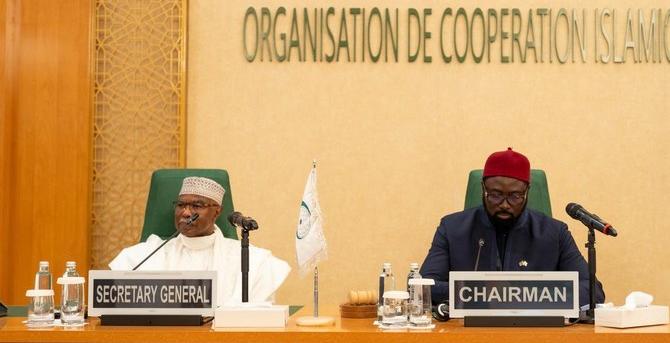
OIC chair warns Hamas leader’s killing risks ‘wider conflict’
text_fieldsRiyadh: The head of the Organisation of Islamic Cooperation stated on Wednesday that there is a chance that the assassination of Hamas political leader Ismail Haniyeh may lead to a "wider conflict" in the Middle East.
According to Gambian Foreign Minister Mamadou Tangara, who was speaking at an extraordinary meeting of member state foreign ministers, the death served only to “escalate the existing tensions potentially leading to a wider conflict that could involve the entire region.”
Haniyeh’s death “will not quell the Palestinian cause but rather it amplifies it, underscoring the urgency for justice and human rights for the Palestinian people,” Tangara, whose country currently chairs the OIC, said, Arab News reported.
“The sovereignty and territorial integrity of nation states are fundamental principles underpinning the international order. Respecting these principles has profound implications and their violation equally carries significant consequences,” he said.
The murder of Haniyeh and the "genocide committed by Israel in the Gaza Strip, the West Bank, and Jerusalem" were condemned by OIC Secretary-General Hissein Brahim Taha. In order to force Israel to respect international law and cease its aggression and attacks that endanger regional and global peace and security, he called on the UN Security Council to take up its duties and take the required action.
Taha stated that in order to reduce the possibility of a full-scale regional conflict that would jeopardise the security and stability of the whole Middle East, the council should demand an immediate and comprehensive end to Israel's continued aggression on the Gaza Strip.
In addition to stating that the required steps should be taken to put into effect the most recent advisory opinion published by the International Court of Justice about the illegality of the Israeli occupation, he emphasised the need for coordinated efforts to force Israel to abide by international legitimacy resolutions.
Taha denounced the resolution passed by the Israeli Knesset that rejected Palestinian sovereignty and labelled UNRWA as a terrorist group.
Additionally, he demanded that UNRWA receive greater political and financial backing for its budget in order for it to fulfil its essential function of offering Palestinian refugees basic services and helping to lessen the humanitarian suffering of the Palestinian people in the Gaza Strip.
In line with international legitimacy resolutions, Taha urged important figures in the world to support a diplomatic process aimed at bringing an end to Israeli occupation and establishing peace based on the two-state solution. On behalf of Foreign Minister Prince Faisal bin Farhan, Saudi Deputy Foreign Minister Waleed Al-Khuraiji attended the meeting, according to the Saudi Press Agency.
He informed the summit that because of Israeli attacks and illegal actions against Palestinians both inside and outside of the Palestinian territories, his government was aware of the risk posed by the rapidly developing events in the Palestinian territories.
He also condemned Haniyeh’s assassination as a “flagrant violation of the sovereignty of the Islamic Republic of Iran, its territorial integrity and national security, international law and the Charter of the United Nations and constitutes a threat to regional peace and security.”























